

RWTH Aachen University. Faculty of Physics. Theory E - Institute for Theoretical Particle Physics and Cosmology. III. Physikalisches Institut B: Elementarteilchenphysik [DE] III. Physikalisches Institut A: Elementarteilchenphysik [DE] Humboldt-Universität zu Berlin. Department of Physics. Experimental Particle Physics. Rheinische Friedrich Wilhelms University of Bonn. Department of Physics and Astronomy. The department pursues innovative experimental and theoretical world-class-research in various areas.
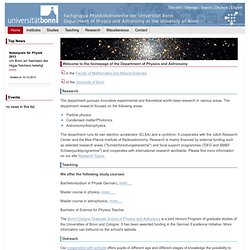
The department research focuses on the following areas: Particle physicsCondensed matter/PhotonicsAstromomy/Astrophysics The department runs its own electron accelerator (ELSA) and a cyclotron. It cooperates with the Jülich Research Center and the Max-Planck-Institute of Radioastronomy. Research is mainly financed by external funding such as selected research areas ("Sonderforschungsbereiche") and focal support programmes ("DFG and BMBF Schwerpunktprogramme") and cooperates with international research worldwide. We offer the following study courses: Bachelorstudium in Physik German), mehr..... Master course in physics, more...... Master course in astrophysics, more..... Theory Department. Experimental Astroparticle Physics and Cosmology.
TU Dortmund. Fakultät Physik [DE] Aktuelle Meldungen und besondere Veranstaltungen: siehe rechte Randspalte → → → Wir über uns 16 Professorinnen und Professoren in 11 Lehrstuhlbereichen sorgen bei uns für ein breites Lehrangebot, unterstützt von mehreren Privatdozentinnen und Privatdozenten sowie Wissenschaftlerinnen und Wissenschaftlern externer Forschungsinstitute, die an unserer Fakultät lehren.
![Fakultät Physik [DE]](http://cdn.pearltrees.com/s/pic/th/willkommen-fakultat-dortmund-25815887)
Mehr als 100 wissenschaftliche und nichtwissenschaftliche Mitarbeiterinnen und Mitarbeiter sind in allen Bereichen von Forschung und Lehre tätig. Die Fakultät wurde 1971 gegründet. In der Forschung wurden die Schwerpunkte zunächst bei der Festkörperphysik und der Teilchenphysik gesetzt, 1980 kam die Didaktik der Physik hinzu und 1985 die Beschleunigerphysik, welche den Dortmunder Elektronenspeicherring DELTA im Zentrum für Synchrotronstrahlung betreibt. Wenn Sie auf unseren Internetseiten nicht finden, was Sie suchen, oder Kommentare dazu haben, schreiben Sie uns eine Mail. E5b - Experimentelle Physik V Astroteilchenphysik [DE] TU Dortmund - Department of Physics - High Energy & Particle Theory Group - Arbeitsgruppe Päs. TU Dresden. Department of Physics.
IKTP - Institute of Nuclear and Particle Physics. Friedrich Alexander University of Erlangen-Nürnberg. Department für Physik [DE] ECAP - Erlangen Centre for Astroparticle Physics. University of Hamburg. Fachbereich Physik [DE] Institut für Experimentalphysik [DE] II. Institute for Theoretical Physics. Collaborative Research Center SFB 676 - Particles, Strings, and the Early Universe. The Collaborative Research Center 676 (Sonderforschungsbereich 676) at Hamburg University is a research programme at the interface of Particle Physics, String Theory and Cosmology.
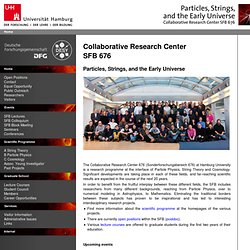
Significant developments are taking place in each of these fields, and far-reaching scientific results are expected in the course of the next 20 years. In order to benefit from the fruitful interplay between these different fields, the SFB includes researchers from many different backgrounds, reaching from Particle Physics, over to numerical modeling in Astrophysics, to Mathematics. Eliminating the traditional borders between these subjects has proven to be inspirational and has led to interesting interdisciplinary research projects. Find more information about the scientific programme at the homepages of the various projects. There are currently open positions within the SFB (postdoc). Upcoming eventsRecent events Other news. Johannes Gutenberg University Mainz.
Research Center Elementary Forces and Mathematical Foundations. ETAP - Experimental Particle and Astroparticle Physics. Despite enormous progress in the understanding of the nature of elementary particles and their interactions, many very fundamental questions still remain unanswered, including: The mystery of dark matter, which is known to exist in the universe in vast amounts, but consists of a particle that so far is unknown.
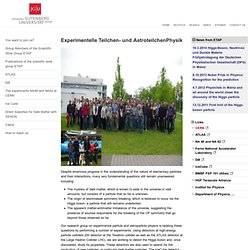
The origin of electroweak symmetry breaking, which is believed to occur via the Higgs boson, a particle that still remains undetected. The apparent matter-antimatter imbalance of the universe, suggesting the presence of sources responsible for the breaking of the CP symmetry that go beyond those observed so far. TU München. Physik-Department - Forschung - Kern-, Teilchen-, Astrophysik - Astroteilchenphysik [DE] Chair for Experimental Physics and Astroparticle Physics. Experimental Physics with Cosmic Particles: Experimental Physics with Cosmic Particles [EN]
Westfälische Wilhelms-University of Münster. Department of Physics. Welcome to the Department of Physics at the WWU Münster.
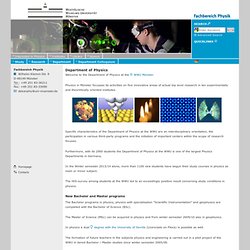
Physics in Münster focusses its activities on five innovative areas of actual top level research in ten experimentally and theoretically oriented institutes. Specific characteristics of the Department of Physics at the WWU are an interdisciplinary orientation, the participation in various third-party programs and the initiation of important centers within the scope of research focuses. Furthermore, with its 2900 students the Department of Physics at the WWU is one of the largest Physics Departments in Germany. In the Winter semester 2013/14 alone, more than 1100 new students have begun their study courses in physics as main or minor subject.
Institute for Nuclear Physics. Navigation: Advanced Search Hauptnavigation:
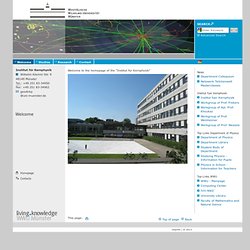
TP - Institute for Theoretical Physics. Institute of Physics and Astronomy. Theoretical Astroparticle Physics. University of Siegen. We are a modern, high-profile university with an international orientation. The University of Siegen is guided by the central principle: “Creating a humane future”. Students and academics from overseas are very welcome.
Today the University of Siegen hosts 15,093 students and more than 11% come from other countries. Our International Office offers a comprehensive service to ensure that you soon feel at home at Siegen. Department Physik [DE] Workgroup Experimental Particle Physics. Eberhard Karls University of Tübingen. Department of Physics. Physikalisches Institut - Subatomare Physik [DE] Institute for Astronomy and High Enery Astrophysics. Kepler Center for Astro and Particle Physics. University of Wuppertal. Physics group. AG Astroteilchenphysik [DE] Julius Maximilian University of Würzburg. Fakultät für Physik und Astronomie [DE] TP II - Theoretical Physics II.